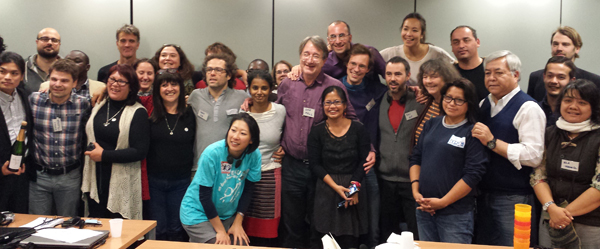In Barcelona last week, 50 water justice activists, trade unionists, researchers and water operators from 29 countries gathered to share analysis and strategies aimed at promoting democratic public water and sanitation services. The groups are loosely affiliated through the Reclaiming Public Water Network, which met previously in 2011.
As Satoko Kishimoto of the Transnational Institute pointed out the global water justice network has won many struggles over the last decade including formal recognition at the United Nations of water and sanitation as human rights.
According to David Hall and Emmanuele Lobina of Public Services International, in the last 15 years, 86 communities have taken water and sanitation services back from private to public hands. This has meant greater public control and often more democratic, equitable and transparent management of water and sanitation services. Despite ongoing pressure from International Financial Institutions (IFIs) and right-wing governments to privatize, the global trend is towards publicly financed and operated water and sanitation systems.
Most recently, Jakarta announced it would buy back its water services. According to Nila Ardhianie of the Amrta Institute for Water Literacy in Indonesia, decades of private sector concessions in Jakarta had led to steep rate hikes, lack of access for lower income households and public outrage.
Under the leadership of David Hall, who retired this year, the Public Service International Research Unit has empirically documented decades of failed privatization schemes around the world. For communities of the Global North and South, privatization has meant rate hikes, a loss in quality of services and a failure to provide universal access.
David’s retirement was marked in Barcelona with cake, cava and video messages from colleagues who were not present. (See photo above)
The meetings in Barcelona reflected a marked shift towards a more proactive discussion on how to promote better public water and sanitation systems and strengthen the resistance to new forms of neoliberal water policy within the public sector.
A discussion facilitated by David McDonald of the Municipal Services Project explored the issue of “publicness,” or what it means to be a public sector operator within a global context where an increasing number of public sector operators are being forced to mimic private sector practices. (Read analysis on the corporatization of public utilities by Jorgen Magdahl of FIVAS here.)
Moving beyond the public/private binary, participants explored what it meant to be a public democratically run operation. To many, this meant rejecting criteria imposed by IFIs emphasizing efficiency and “affordability” to prioritize more progressive performance criteria including human rights, health and safety for workers, universality etc.
Among the strategies, being pursued by communities promoting public operation are public-public-partnerships (PuPs) — the public sector’s response to privatization under the guise of private-public partnerships (P3s). PuPs are designed to take advantage of the innovative, groundbreaking solutions existing within the public sector. Through PuPs water operators are able to train each other, share resources and public sector know-how on a not-for-profit basis. Marcela Olivera and Adriana Marquisio of the Plataforma de Acuerdos Publico-Communitarios de las Americas shared successful models for public-community partnerships being used in Bolivia and Uruguay to enable communities to cooperate and support each other in the management of water and sanitation services.
For more analysis on public-public partnerships, see:
– Public Public Partnerships by Transnational Institute (TNI) (web page)
– Public-public partnerships (PUPs) in water, by PSIRU and TNI (Word document)
While many water justice activists are both celebrating and grappling with the new challenges of life after water privatization, in many parts of the world, the financial crisis is being used to breathe new life into the pro-private agenda. As Italian water activist, Tommaso Fattori puts it, “that which was previously marketed as “better” and “efficient” is now simply passed off as “compulsory”: they say that it is necessary to sell off and privatise in order to raise cash and thus decrease public debt.
In Canada, where the right-wing government is using its fiscal transfer powers to aggressively promote privatization, the Council of Canadians and Canadian Union of Public Employees has been working with community activists to provide municipalities with tools to defend public water and sanitation systems through the Blue Communities Project.
In Greece, where the EU Troika has pressured the government to sell public assets as part of its austerity package, an upcoming Supreme Court decision may reverse plans to transfer two major state utilities to private hands on grounds that water is legally a public good — a hard-won victory for the Save Greek Water Coalition, a citizen and worker-run initiative against privatization of water in Greece.
For a recent update, see an Update on the campaign to stop water privatization in Greece.
After two days of strategizing, members of the Reclaiming Public Water Network took its messages to a broader platform by attending meetings of the Global Water Operators Partnership Alliance, a United Nations- led network of public water operators.



